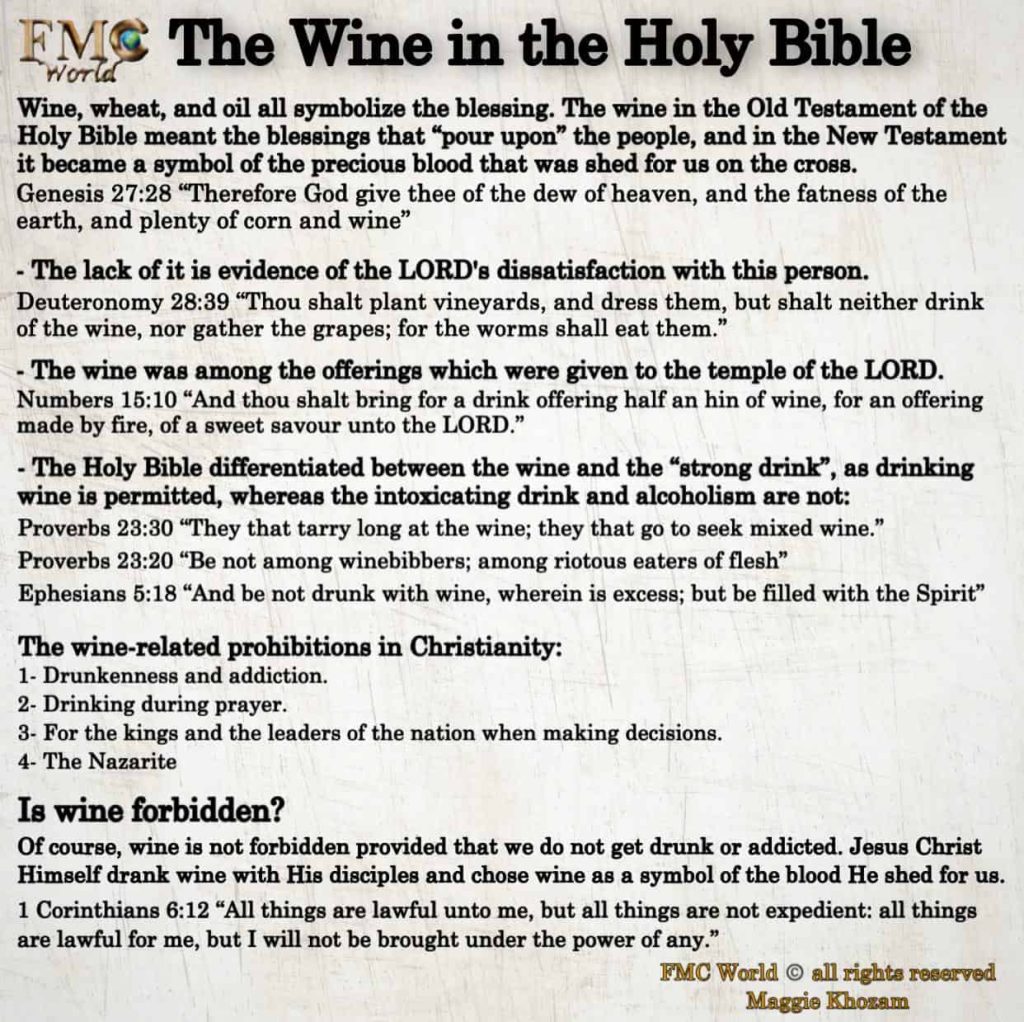

In the old days, they relied on crops and animal products as means of sustaining themselves, and when the LORD wanted to bless a people, He would bless their wheat, wine, and oil, so the vineyards would be blessed. The wine in the Holy Bible, specifically in the Old Testament, meant the blessings that “pour upon” the people.
When Isaac blessed his son Jacob, he blessed his land so it would overflow with grain and wine
Genesis 27:28 “Therefore God give thee of the dew of heaven, and the fatness of the earth, and plenty of corn and wine”
Also, Moses’ blessing for the children of Israel in:
Deuteronomy 7:13 “And He will love thee, and bless thee, and multiply thee: He will also bless the fruit of thy womb, and the fruit of thy land, thy corn, and thy wine, and thine oil, the increase of thy kine, and the flocks of thy sheep, in the land which He sware unto thy fathers to give thee.”
To this very day, we find that the person who can bring wine to drink is the person to whom the LORD has given sufficiency and blessing. Let us not forget that we must distinguish between the wine (aged grape juice) and the strong drinks (intoxicating drinks).
Moses says to those who do not obey the Commandments in:
Deuteronomy 28:39 “Thou shalt plant vineyards, and dress them, but shalt neither drink of the wine, nor gather the grapes; for the worms shall eat them.”
If the LORD gets angry with a person, He will not give him enough vineyards, and the worms will eat them; thus he will not be able to make wine to drink.
– In Zephaniah 1:13 we notice that one of the LORD’s punishments upon a people was cutting off the wine from their land
“Therefore their goods shall become a booty, and their houses a desolation: they shall also build houses, but not inhabit them; and they shall plant vineyards, but not drink the wine thereof.”
– The wine was mentioned in the Old Testament among the offerings which were given to the temple of the LORD. There are more than 20 verses on how to present the tithes, offerings, heave offerings, and the way to atone for sins
Exodus 29: “37- Seven days thou shalt make an atonement for the altar, and sanctify it; and it shall be an altar most holy : whatsoever toucheth the altar shall be holy.
38- Now this is that which thou shalt offer upon the altar; two lambs of the first year day by day continually.
39- The one lamb thou shalt offer in the morning; and the other lamb thou shalt offer at even:
40- And with the one lamb a tenth deal of flour mingled with the fourth part of an hin of beaten oil; and the fourth part of an hin of wine for a drink offering.”
Numbers 15:10 “And thou shalt bring for a drink offering half an hin of wine, for an offering made by fire, of a sweet savour unto the LORD.”
Throughout the days of the kings of Israel, who willingly worshiped the LORD God, the wine, grains, and oil were always found in their storehouses in order to be presented to the temple of the LORD.
The wine cannot be forbidden, as it is one of the things with which the LORD blesses the people. The Holy Bible is very clear, it did not say: “ He blesses the wheat, oil, and grapes,” but it rather said, “the wine” in all verses.
In (Ecclesiastes 9) there is another evidence of the LORD’s blessing of the wine
Ecclesiastes 9:7 “Go thy way, eat thy bread with joy, and drink thy wine with a merry heart; for God now accepteth thy works.”
The difference between the wine and the intoxicating drinks:
The Holy Bible explicitly differentiated between the wine and the “strong drink”, as drinking wine is permitted, whereas drinking the intoxicating drink and alcoholism is not:
– Proverbs 23:30 “They that tarry long at the wine; they that go to seek mixed wine.”
– Proverbs 23:20 “Be not among winebibbers; among riotous eaters of flesh”
Here, the used word is “winebibbers” (i.e., drunkards), and not “those who drink wine”. The winebibber is the person who habitually drinks a lot, i.e., the addicted.
– 1 Timothy 3:3 “Not given to wine, no striker, not greedy of filthy lucre; but patient, not a brawler, not covetous”
– Titus 2:3 “The aged women likewise, that they be in behaviour as becometh holiness, not false accusers, not given to much wine, teachers of good things”
– 1 Peter 4:3 “For the time past of our life may suffice us to have wrought the will of the Gentiles, when we walked in lasciviousness, lusts, excess of wine, revellings, banquetings, and abominable idolatries”
The Apostle Peter addressed the people who converted to Christianity, asking them to stay away from certain things, including alcohol addiction.
– Ephesians 5:18 “And be not drunk with wine, wherein is excess; but be filled with the Spirit”
– As for the clergy:
1 Timothy 3:8 “Likewise must the deacons be grave, not doubletongued, not given to much wine”
Also, Titus 1:7 “For a bishop must be blameless, as the steward of God; not selfwilled, not soon angry, not given to wine, no striker, not given to filthy lucre”
The Holy Bible reaffirms the prohibition of alcoholism, but not the prohibition of drinking wine; which applies to both, the clergy and the general public as well.
The wine-related prohibitions in Christianity:
1- Drunkenness and addiction.
2- Drinking during prayer.
Leviticus 10:9 “Do not drink wine nor strong drink, thou, nor thy sons with thee, when ye go into the tabernacle of the congregation, lest ye die: it shall be a statute for ever throughout your generations”
3- For the kings and the leaders of the nation when making decisions:
Proverbs 31:4 “It is not for kings, O Lemuel, it is not for kings to drink wine; nor for princes strong drink”
4- The Nazarite
Numbers 6:3 “He shall separate himself from wine and strong drink, and shall drink no vinegar of wine, or vinegar of strong drink, neither shall he drink any liquor of grapes, nor eat moist grapes, or dried.”
It was also forbidden for a pregnant woman with a Nazarite to drink wine. When the angel spoke to Samson’s mother during her pregnancy, he warned her not to drink wine because she was pregnant with a Nazarite to the LORD
Judges 13:4 “Now therefore beware, I pray thee, and drink not wine nor strong drink, and eat not any unclean thing”
The difference between the wine and the strong drink (mixed wine):
Wine is made exclusively from aged grape juice, while the process of making the intoxicants varies. Here are some kinds of drinks and the ways of preparing them, so that we can tell the difference:
• Vodka: It is made from potatoes, barley, yeast, and water.
• Tequila: it is made from the blue agave plant (tequila agave), then water and yeast are added to it. The alcohol content in it ranges between 35-55%.
• Beer: It is made from barley, wheat, and oats, and then it is mixed with water and yeast.
• Whiskey: It is made from fermenting grains, then water, yeast, and some flavorings are added to it.
• Arak: It is a well-known alcoholic beverage in Lebanon and Syria. It is made by distilling grapes, and it can also be made from figs and dates. Sugar is added to it for sweetening, or aniseed, according to each country.
As for wine, it is the only drink to which no additives are added; it is not mixed with anything else, nor is it intoxicating if it is not being drunk to excess.
Wine is also used in some pharmaceutical industries (such as cough medicine, stomach medicine).
And we find the Apostle Paul telling us 2000 years ago about the benefits of wine in some medical conditions
1 Timothy 5:23 “Drink no longer water, but use a little wine for thy stomach’s sake and thine often infirmities.”
As wine was used for stomachaches, cleansing wounds, and other things.
How do we respond to those who think that wine is something defiled or an abomination?
We find the great response in:
Romans 14:14 “I know, and am persuaded by the LORD Jesus, that there is nothing unclean of itself: but to him that esteemeth any thing to be unclean, to him it is unclean.”
Finally, in a direct and decisive answer to the question: “Is wine forbidden?”
The answer is: “Of course not.”
Colossians 2:16 “Let no man therefore judge you in meat, or in drink, or in respect of an holyday, or of the new moon, or of the sabbath days”
For Christians, the children of the LORD, are free in Christ, so no one should be allowed to bind them.
1 Corinthians 6:12 “All things are lawful unto me, but all things are not expedient: all things are lawful for me, but I will not be brought under the power of any.”
Everything is lawful for us, but the criterion of the son of the LORD remains in setting limits, and knowing what is appropriate for him, as a son of the LORD, to do and what is not.
Titus 1:15 “Unto the pure all things are pure : but unto them that are defiled and unbelieving is nothing pure; but even their mind and conscience is defiled.”
This is the explicit response about what is permissible and what is forbidden concerning food, drinks, and other things in Christianity. There is nothing defiled by itself, thus if you are unclean, you will see the wine unclean as well; you are defiled because deep inside you, you are unclean even if you only drink water.
As for the children of the LORD in whom the Holy Spirit dwells, that is, the Spirit of the LORD, nothing will ever defile them, no matter what they drink or eat.
Sep / 10 / 2019